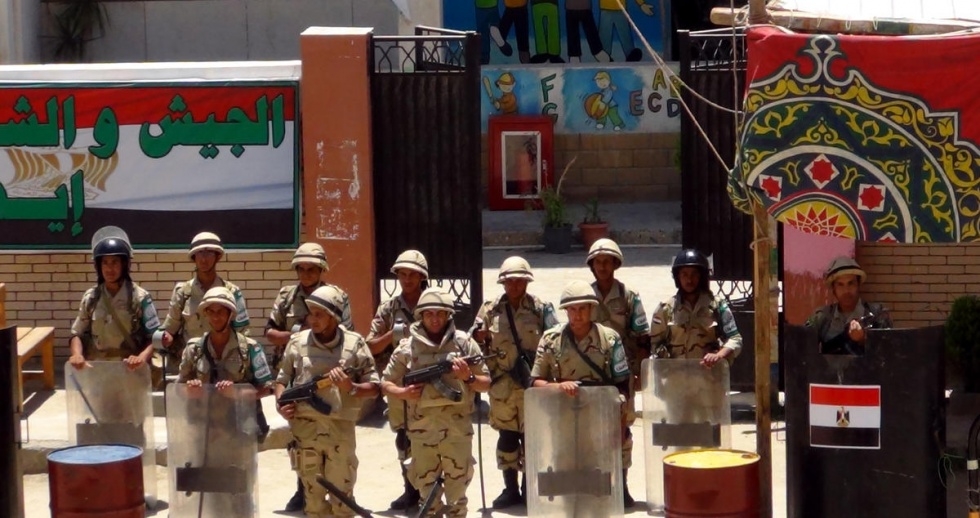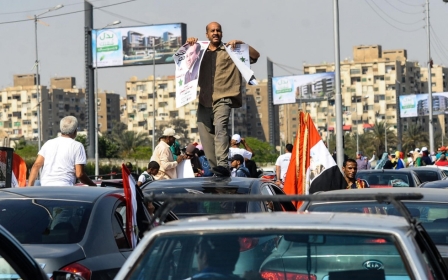Pillar of autocracy: Egypt’s presidential election law

Earlier this year Egypt’s interim government promulgated a new law to govern the country’s presidential election. That law regulates the administration, adjudication, and validation of the campaign period and electoral process of this week’s vote. The law has created a legal structure which has buttressed the political context created by the interim government to guarantee an electoral result amicable to the state’s interests.
Like any law, the presidential election law contains many unremarkable articles. For example, the total number of required endorsements needed to collect from the Egyptian people decreased from 30,000 for the 2012 presidential election to 25,000 this year. Nonetheless, in 2012 there were 13 candidates for the presidency; this year there are only two: former Field Marshal Abdel Fattah el-Sisi and Hamdeen Sabbahi. This likely has more to do with the process being viewed as a sham than the legal requirements for candidacy. However, the most important feature of the law is the new Presidential Election Committee (PEC), which is composed of present judicial Egyptian authorities who will act as an electoral management body.
The PEC has a broad range of powers and discretion: it alone creates a timeline of the election, approves the candidates, creates voter lists, administers penalties for interfering with the election, decides on polling locations, and reviews challenges to any election-related governmental action or claims of election fraud. Under Article 6, the PEC has the power to ensure equal treatment of the presidential candidates in state-owned media. Generally, it has broad control over the media, candidate campaigning, and campaign finance during the electoral period, and has prohibited campaigning two days before voters go to the polls.
Under the 2014 Egyptian constitution, polling stations will be supervised by members of the judiciary appointed by the PEC. The presidential election law allows for each presidential candidate to have a representative at each polling station, as well. Interestingly, the International Foundation for Electoral Systems (IFES) has suggested that the PEC should require the polling station official to initial or sign ballot papers before distributing them to voters as a protection against ballot counterfeiting. It remains to be seen if this recommendation is incorporated this week. After the election is over vote-counting will occur at the polling stations in front of the authorized observers such as the PEC and candidates representatives, and approved external actors such as the EU, the African Union, and Democracy International.
The most troubling characteristic of the presidential election law is that all decisions of the PEC are only reviewable by the PEC itself. No decisions can be appealed to an external judicial or government entity. Especially interesting, under Article 228 of the 2014 Egyptian constitution, this will be the only election managed by the PEC; future presidential elections will be managed by the national election commission (NEC), which will be in charge of Egypt’s legislative elections later this summer. The decisions of the NEC are in fact appealable. So why did the military-backed interim government create a body of named members of the maligned judiciary to have un-reviewable authority over only one election in which former Field Marshal Abdel Fattah el-Sisi has been heavily favored for some time? As the interim government could have easily allowed for appeals to the Supreme Constitutional Court, the answer can only be political in nature: the assurance of a state-desired result.
New MEE newsletter: Jerusalem Dispatch
Sign up to get the latest insights and analysis on Israel-Palestine, alongside Turkey Unpacked and other MEE newsletters
Beyond the law itself, there will be no surprise on 5 June if the results are heavily in favour of Sisi. Religiously-based parties, the Muslim Brotherhood, and April 6 have been banned and dissenters have been jailed, leading Marc Lynch, Director of George Washington University’s Institute for Middle East Studies, to write that the election is occurring “amidst a massively repressive atmosphere of intimidation, arrest, and institutional bias.” A free election cannot occur in the context of violence and fear which the interim government has created, as the opposition has no reasonable measure of confidence that free expression will not be met with imprisonment. Just last week hundreds more suspected Muslim Brotherhood members were thrown in jail.
Sisi does not support reconciliation with the Muslim Brotherhood (though the Brotherhood has expressed no interest in serious negotiation and will boycott the election), suggesting ongoing tensions in the immediate future. Sisi also supports the protest law which has been used continuously to arrest human rights advocates and regime opponents. The former field marshal also views the legitimate security threats to the state stemming from Sinai, Libya, and Syria as part of a war against terrorism. This ‘war on terror’ rhetoric of the interim government and Sisi alike may explain the apparent need felt for armored vehicles from the UAE in order to maintain order during this election.
The presidential election law has not itself created a fraudulent election. However, the legal infirmaries of the law, combined with an electoral context of fear and oppression, will insure that this week’s vote will not be free and fair: many regime opponents are in jail or banned from the political process, dissent has been criminalised by the protest law, and there exists no recourse for electoral decisions made by the PEC. Elections are necessary, but not sufficient for a democratic state: the people must be free to express their opinions and openly hear the opinions of their compatriots in order to make an informed electoral decision. That has not occurred over the past seven months and will not occur this week, either.
- Ryan J Suto is an independent analyst on the rule of law in the Middle East.
The views expressed in this article belong to the author and do not necessarily reflect the editorial policy of Middle East Eye.
Photo credit: Military soldiers stand guard as Egyptians started casting their ballots in Beni Suefon 26 May (Anadolu Agency)
Middle East Eye delivers independent and unrivalled coverage and analysis of the Middle East, North Africa and beyond. To learn more about republishing this content and the associated fees, please fill out this form. More about MEE can be found here.




